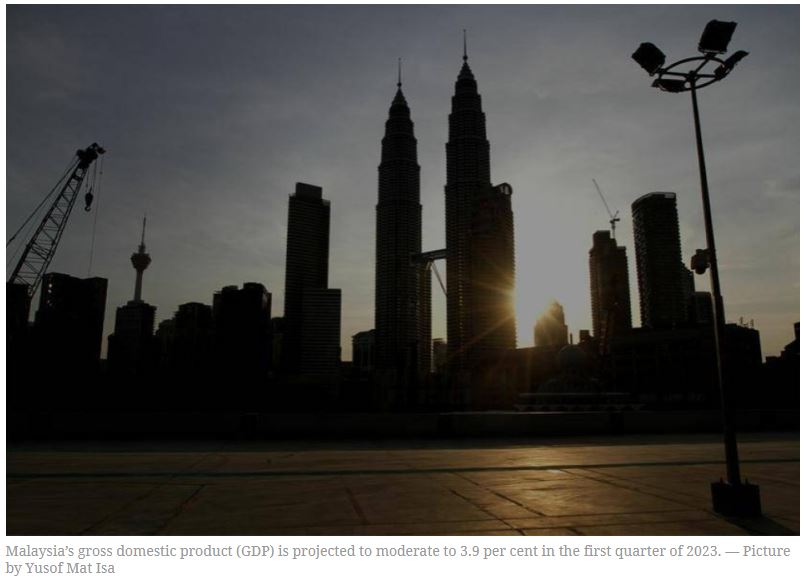Kenanga Research: Malaysia to see moderate growth of 3.9pc for 1Q 2023
KUALA LUMPUR, Jan 5 — Malaysia’s gross domestic product (GDP) is projected to moderate to 3.9 per cent in the first quarter of 2023 (1Q 2023) amid the risk of a global economic slowdown, said Kenanga Research.
In a note today, the research firm said a global economic slowdown is likely to drag the country’s export performance and commodity prices and this would also be weighed by the threat of rising inflation
It noted that this could in turn, trigger further financial tightening on the back of Bank Negara Malaysia’s (BNM) overnight policy rate (OPR) hikes.
“Nevertheless, we see the downside risk on growth to be limited given the lower political risk premium, following the outcome of a unity government formation, and resilient private spending backed by various policy support such as the continuation of subsidies and cash transfer programmes for the B40 group, as well as the positive impact of China’s relaxation of its zero-Covid policy.
“In addition, the gradual pick-up in tourist arrivals will continue to support the recovery in the tourism sub-sector and further improve the labour market condition, especially in the services sector,” it said.
Against this backdrop, Kenanga Research retains the 2023 GDP growth projection of 4.3 per cent amid normalisation in the domestic economy, as the nation gradually transitions to the post-pandemic phase.
It also noted that external downside risks to Malaysia’s growth remain, arising mainly from ongoing concerns about a recession in the United States amid a hawkish Fed, as ongoing geopolitical tensions and a worsening energy crisis in Europe.
Besides, surging Covid-19 cases in China could also spark fears about the emergence of new Covid-19 variants or subvariants.
Nonetheless, China’s policy switch may eventually support growth going forward, Kenanga Research said.
Fiscal deficit at 5pc, headline and core inflation average at 2.5pc, 2.3pc
It also said the newly-elected government is expected to continue with a federal budget that is mildly expansionary in 2023, with only minor revisions to be re-tabled on February 24.
It expects the federal government to continue with various subsidies for the people, mainly to protect against the impact of the rising cost of living.
“We believe the government would eventually embark on fiscal reform in the medium term, especially in the taxation area, to strengthen its fiscal position. For now, we expect there would be a limit to fiscal expansionary owing to the fiscal deficit and rising debt.
“Hence, we retain the fiscal deficit forecast for 2023 at 5 per cent of GDP, from 5.7 per cent in 2022, amid expectations of slower GDP growth, with the deficit amounting to RM97.0 billion largely to finance development spending and continuation of the Covid-19 fund to help spur the economy,” it added.
Moving forward, the government’s measures to reduce the cost of living, coupled with a stronger ringgit, slowing global demand, and an improvement in the global supply chain due to China’s eventual reopening, may bring headline and core inflation down to average around 2.5 per cent and 2.3 per cent, respectively, in 2023.
“Federal government debt is expected to edge higher to 61.8 per cent of GDP in 2023 (2022: 61.0 per cent), on the back of another expansionary budget albeit a mild one.
“Nonetheless, statutory debt will likely remain well under the 65.0 per cent limit even as we expect a higher gross issuance of RM178.0 billion worth of government bonds this year,” it said.
BNM to keep OPR at 3.25pc, ringgit to strengthen to 4.11 against US dollar
For the fifth consecutive time, BNM is expected to raise the OPR by 25 basis points (bps) in January.
However, in March, Kenanga Research said it is only assigning a 50.0 per cent probability of another similar-sized rate hike due to the expectation of a global economic slowdown and increasing uncertainties, especially on the geopolitical front.
Therefore, Kenanga Research expects the terminal rate to be around 3.00-3.25 per cent, in line with the long-term OPR average, after which it anticipates BNM to keep it unchanged for the rest of 2023.
“Meanwhile, the ringgit may weaken against the US dollar to around 4.48 in 1Q 2023 due to the increasing BNM-Fed monetary policy divergence.
“However, moving into 2H 2023, the ringgit is expected to rebound and strengthen to around 4.11 by the end of 2023, mainly due to the expectation of a Fed pivot,” the research firm said.
Meanwhile, foreign demand for Malaysia Government Securities (MGS) may remain mildly pressured in 1H 2023 amid weak global risk appetite, before charting a strong recovery from 2H 2023 onwards after most major central banks complete their tightening cycles and global risk sentiment begins to improve.
It revised its end-2023 forecast for the 10-year MGS yield to 3.70 per cent from 3.80 per cent previously (2022: 4.07 per cent). — Bernama


 English
English




